Sebastian Castillo, author of SALMON (Shabby Doll House, 2023), just published a limited edition chapbook titled The Zoo of Thinking with California-based press, Smooth Friend. You can’t buy it anymore. The print run of one hundred hand-stitched copies sold out within weeks to customers in the United States.
Inattentive or international Castillo fans will have to wait for the release of Fresh, Green Life, out from Soft Skull in June, to get their next fix of Sebastian’s prose offerings.
I reached out to Castillo to ask what drew him to the chapbook form in between publishing ‘real books’.
‘I sort of think of chapbooks as books. I don't even like to make a distinction that there is a chapbook and then there is a “real book”. To me chapbooks are also books, they’re just very short books, often self-produced. And so The Zoo of Thinking, for example, I think of it as a book and I don't think of it as a chapbook. It's 12,000 words which, yes, is very short, though a little longer than your traditional chapbook and much shorter than a traditional book. It sort of exists in an in-between space, I suppose, but to me it's a book. My first book, 49 Venezuelan Novels, I think it was like 5,000 words. You know it's 49 things. Is that a book? Was it a chapbook? They're all books to me. I remember reading an interview with César Aira who said that sometimes when he would write a short story, let's say a few thousand words, he said that he felt that it should be bound and released, you know, as its own object, that even a short story should be treated as a book. All of this, I agree with, and pleases me.’
I countered Castillo with the idea that while it’s all well and good to not want to make the distinction between chapbooks and books, it’s also unrealistic or idealistic at best. The distinction between chapbooks and books, as far I see it, can be made in terms of production and distribution. A chapbook is usually hand-made, produced in a limited quantity, and distributed by the publisher or author themselves. A book is more typically mass-produced, and often distributed by a larger corporation. A book has an ISBN.
Of course there are some crossovers. Especially in the small press world. But The Zoo of Thinking is surely a chapbook? I needed more input.
I talked to Aidan Ryan, author of the forthcoming (full-length) book, I AM HERE YOU ARE NOT I LOVE YOU, and publisher at Foundlings Press, an independent operation based out of Buffalo, New York. I wanted to know what drew him to the form.
‘What is a chapbook? Let's start there. You know, unlike a book, no one really knows what a chapbook is and we don't really talk about what a chapbook is a ton. Foundlings became a press from a magazine by publishing a chapbook but it kind of looked like a book: It was perfect bound, it was longer than most chapbooks, by many measures, it just looked like a book. So we really didn't know what we were doing or getting into from the start. As time has gone on I've been drawn to the form as a publisher because it gives me an opportunity to work with authors who otherwise should be putting their full-length books on bigger presses that can do more for them. For a lot of people, it’s not just a vanity thing, you want to reach more people, and this is some people’s living, you know, their whole life and they need to make a little more money from it than we could possibly provide for them because of our limited reach. So when people like Mary Ruefle or D.A. Powell, more established people, publish with us, it’s because the form and the context that we can provide, fit in a way. You know they’re publishing on Wave or Copper Canyon or whatever and selling a few thousand copies of every book, and we might just print 200 copies of their little chapbook, but I think it gives people a space to be experimental.’
Iconic San Diego poet, Ana Carrete, concurs:
‘Chapbooks are different to full-length books for me because sometimes I’m playing with an idea, kind of like a story, and then if I make the chapbook I guess I can see if there’s potential for it to go longer than that. I guess mainly it feels free and I, for the most part, don’t need anyone. I’ve done a lot of self-published ones. It’s just easy, and how I started. The last one I did not publish myself, the last few I think I tried to send it out to a person to get some edits and feedback, but I just feel more free to do whatever I want in a chapbook, or zine.’
‘And the part about getting paid for your work, in full, via a chapbook that you self-publish or anything that you self-publish, it kind of, when you’re starting, gives you confidence and validation, like oh wow, people actually want to pay $5 for this, or whatever. It is helpful when starting.’
‘The thing that makes physical copies special, or why it feels important, I don’t know what it is about, but I have so many, and I guess just because websites expire and people stop posting or whatever, people log off or disappear and you lose track of them because they cancel their account and then when they come back they use something different and then you’re no longer following each other... I feel like there are so many people that I don’t know anything about them anymore but I have so many old little zines from, I don’t know, 2008. All these random people were just shipping you a little zine with other people that you didn’t know. You had no idea what they looked like. There was a mystery about it. It was so fun. You maybe had a link to someone’s blog but you didn’t have that much information about a person and that made it special to me.’
Twice, in recent years, when I’ve seen New York-based poet, Jonathan Aprea, he’s handed me a copy of a new, self-published, hand-made chapbook. There’s no information about them online, they’re not mentioned on his website. But they’re really beautiful little objects, and the work inside them is gorgeous too.
In fact, I asked if I could publish one of the poems as part of the Shabby Doll House Advent Calendar, a couple of years ago, after reading it first in the secret chapbook.
‘There were a few reasons I decided to make those.
The first is that at the time that I made them, a few different friends were running poetry open mics, and so I was reading at a bunch of open mics, and when I give a reading it’s fun to have something that I can give to people who hear and like my poems.
I didn’t realize it at the time but it also turned out to be a great way to share my poems with friends who I was close with but who didn’t have a super zoomed in view of the poetry I was writing. I think this was the most gratifying thing about writing these chapbooks - to be able to share otherwise unpublished work with friends without having to wait to get something accepted and published in a journal or mag. Giving someone a handmade chapbook kind of feels like a special thing, and so many people have been very complimentary about them, which is incredible and makes me want to write more.
The third reason is that submitting a chapbook manuscript can be a long and tiring process, with a lot of rejection, and it felt very empowering to just say, actually, I don’t need to submit these poems to a publisher, I can just share them with people myself, and I don’t need to wait for someone else’s production schedule to do it. (I don’t know why everyone doesn’t do this! The poetry world would be so much more fun if everyone was making and sharing little zines.)
Which brings me to the last reason, which is that it’s just very fun to make a small chapbook. I got to be the editor and the designer, I got to choose the cover paper and the interior paper, I got to design and hand paint the covers. I had a really good time doing all of this, and it felt really good to see the finished product come together. And it didn’t even take very long. Maybe a week of evenings per chapbook.’
My copy is looking well-loved.
But what about this question of the distinction between a chapbook and a full-length book?
Earlier this month, Rachelle Toarmino, editor of Peach Mag, and a prolific author of chapbooks, announced two new publications. On January 9th, she revealed (on Instagram) that she had won Sixth Finch’s chapbook contest and they will be publishing her chapbook, My Science, this spring.
And then ten days later, she announced (on Instagram again) that her second full-length collection, HELL YEAH, will be published by Third Man Books this summer!
It’s a great time to be a reader of Rachelle Toarmino.
I asked Toarmino what draws her to the chapbook form:
‘I think it’s just that, for all my chapbooks, I think the projects just ended up being shorter. It hasn't been a thing where I've gone into it and been like... This is going to be a chapbook so I'm going to write between 15-30 pages of poetry.
For Personal and Generic, that embroidery one from 2016, that was from a February one-a-day project that ended up being 28 poems, so it was just a good length. And then for Feel Royal, because it was a process-based one, I did about 10 at a time and then by the third round, I didn’t want to keep doing it. For a while, I thought, maybe I'll keep going and I’ll eventually do a book, but I just got bored with the project by then. And then for Come Back, which is 10 sections in a long poem, it’s kind of on the shorter end of a chapbook, but Foundlings let me do it. And then for the new one that’s coming out, it’s this middle section from my (full-length) book, and it’s also a long serial poem, though it’s in sections across like 30 pages, so that just ended up being its own kind of complete unit.
I know some poets will do the whole ‘chapbook as EP for the LP longer book’ but I haven't ever submitted a chapbook like that. It's just whatever feels like a complete unit, usually just shorter things…. It's just the way that it's been for me.’
So where does all this leave us? Chapbooks are just books that run out of steam? Chapbooks are a place to try and fail and then try again? Chapbooks are an archive of the other lives we once lived? Chapbooks are an accident? Chapbooks are 12,000 words of fiction or 15-30 pages of poetry? Chapbooks are just books? There is no distinction?
I told Aidan Ryan about Sebastian Castillo’s point of view, and he wasn’t having any of it:
‘I think that I disagree with Sebastian vehemently, I think there is a difference between a chapbook and a book and perhaps I’ll drive down to Philadelphia and we’ll rent out a concert hall and we’ll have a high profile public debate on this issue and one of us will win the debate as judged by the audience applause!’
I’m so ready.
The Chapbook Factory starts on February 9th. You can find out more details here. The deadline to sign up is February 3rd, which is a week from today. Places are first come first served and spots are limited.
Come join us, it’s going to be fun :)


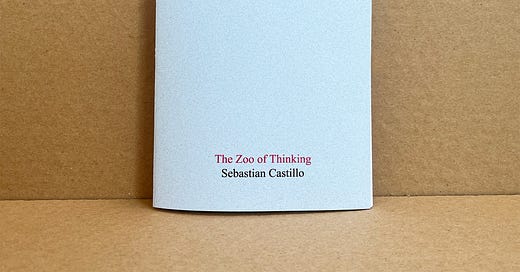



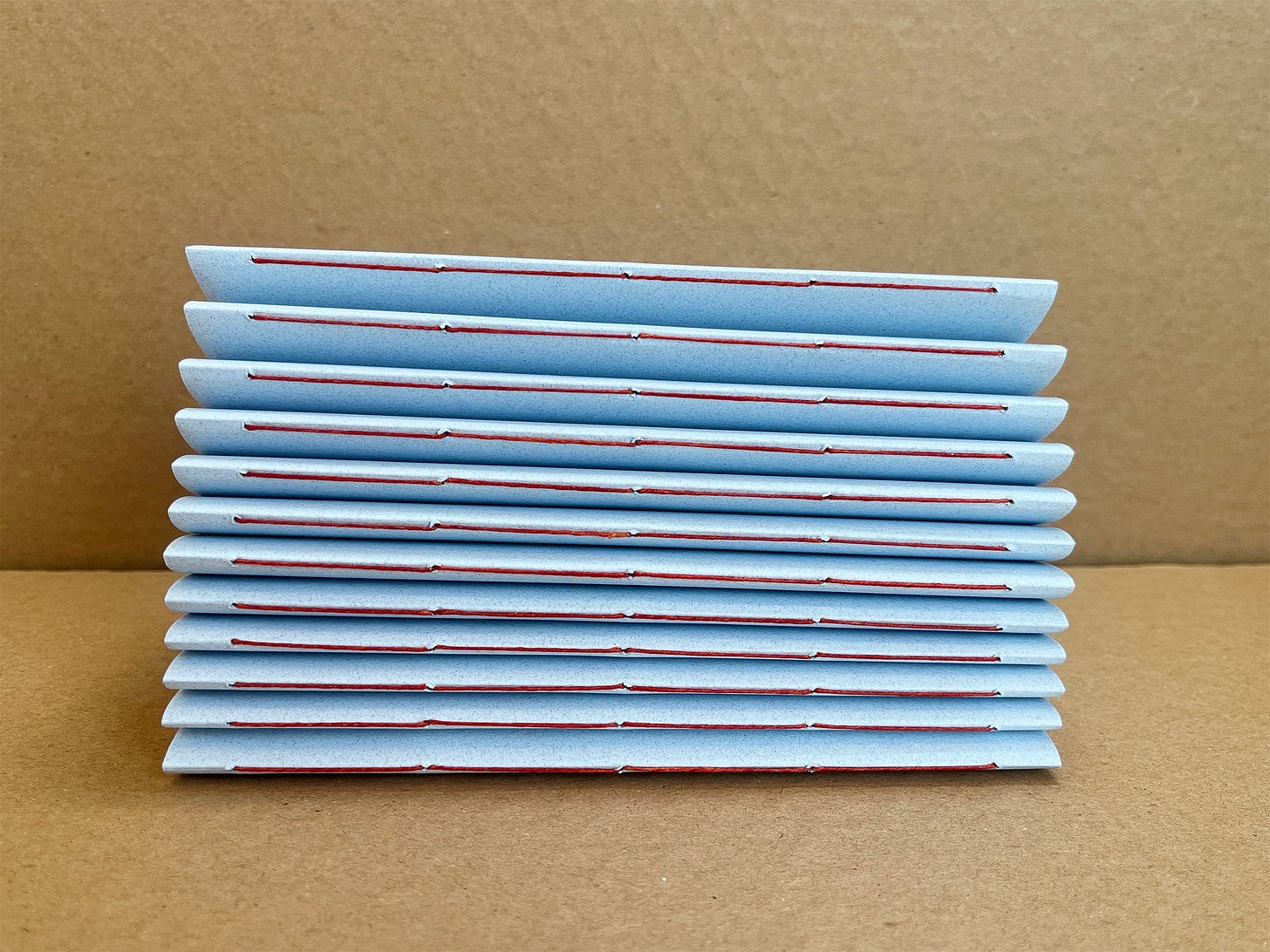
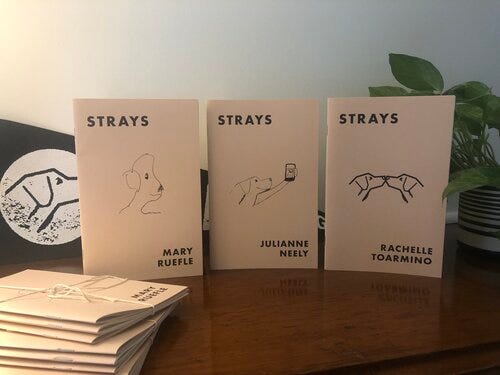
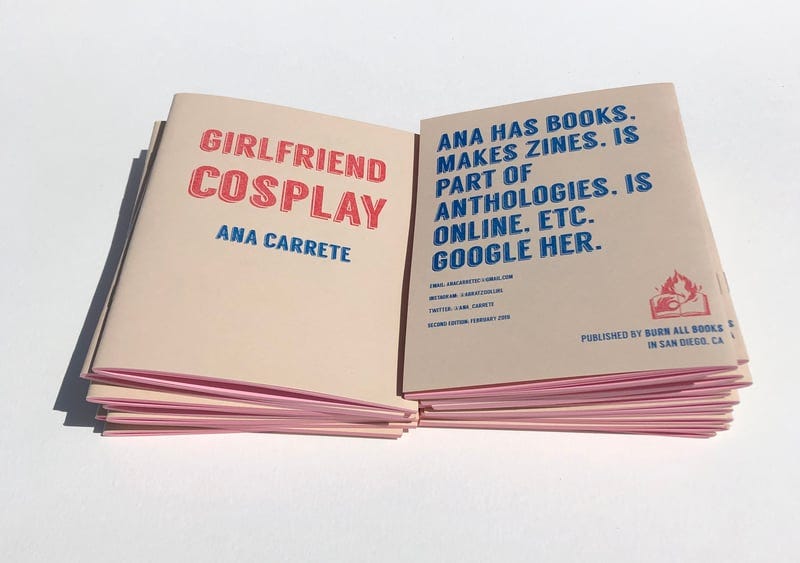

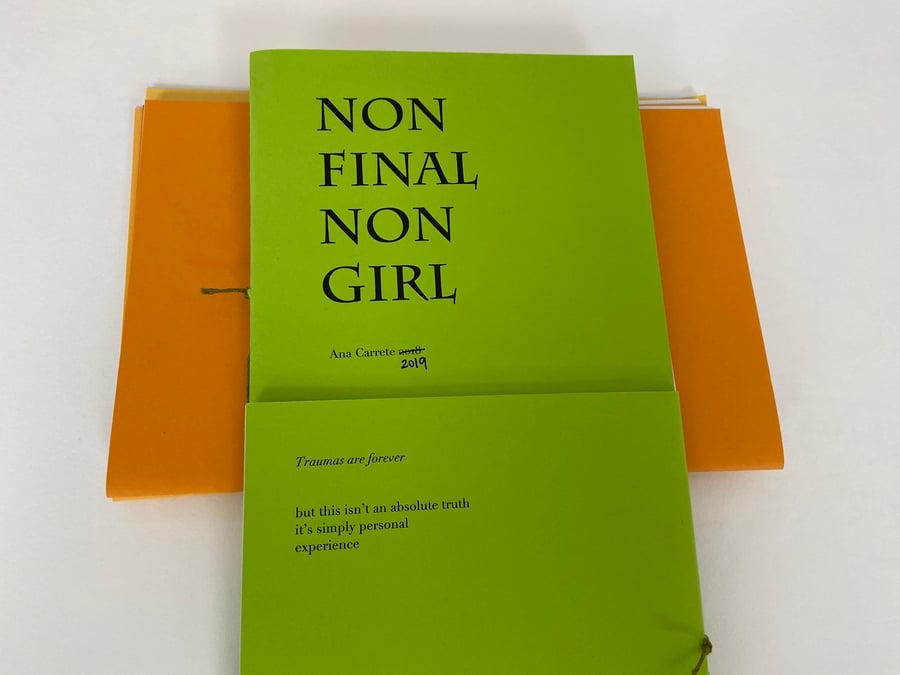
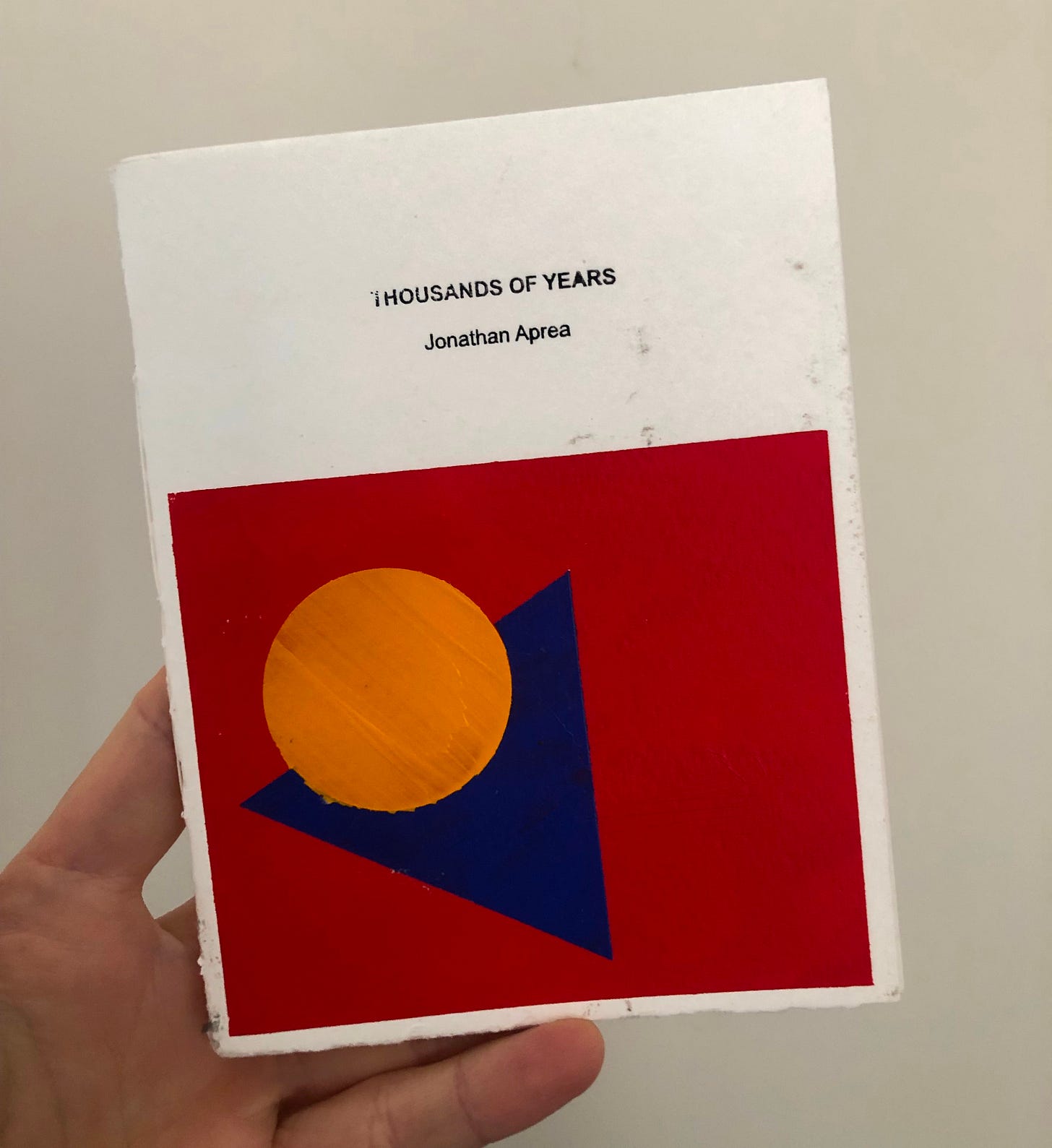



If Castillo says it’s a book, I’m here for it, no debate needed. Literature should be as free and unclassified as a good plot twist!
Love this